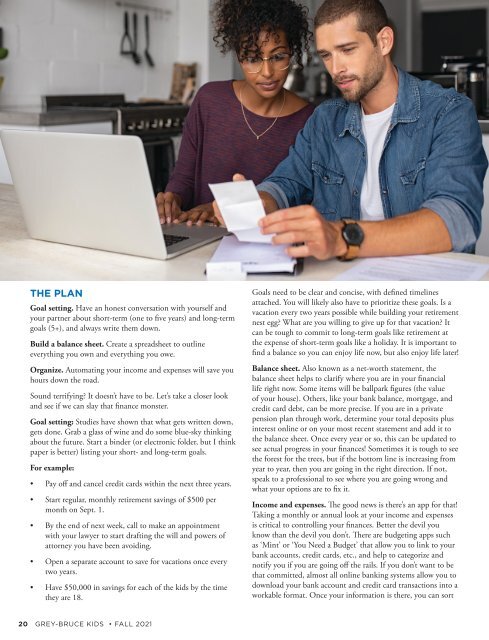Grey Bruce Kids Fall 2021
You also want an ePaper? Increase the reach of your titles
YUMPU automatically turns print PDFs into web optimized ePapers that Google loves.
THE PLAN<br />
Goal setting. Have an honest conversation with yourself and<br />
your partner about short-term (one to five years) and long-term<br />
goals (5+), and always write them down.<br />
Build a balance sheet. Create a spreadsheet to outline<br />
everything you own and everything you owe.<br />
Organize. Automating your income and expenses will save you<br />
hours down the road.<br />
Sound terrifying? It doesn’t have to be. Let’s take a closer look<br />
and see if we can slay that finance monster.<br />
Goal setting: Studies have shown that what gets written down,<br />
gets done. Grab a glass of wine and do some blue-sky thinking<br />
about the future. Start a binder (or electronic folder, but I think<br />
paper is better) listing your short- and long-term goals.<br />
For example:<br />
• Pay off and cancel credit cards within the next three years.<br />
• Start regular, monthly retirement savings of $500 per<br />
month on Sept. 1.<br />
• By the end of next week, call to make an appointment<br />
with your lawyer to start drafting the will and powers of<br />
attorney you have been avoiding.<br />
• Open a separate account to save for vacations once every<br />
two years.<br />
• Have $50,000 in savings for each of the kids by the time<br />
they are 18.<br />
Goals need to be clear and concise, with defined timelines<br />
attached. You will likely also have to prioritize these goals. Is a<br />
vacation every two years possible while building your retirement<br />
nest egg? What are you willing to give up for that vacation? It<br />
can be tough to commit to long-term goals like retirement at<br />
the expense of short-term goals like a holiday. It is important to<br />
find a balance so you can enjoy life now, but also enjoy life later!<br />
Balance sheet. Also known as a net-worth statement, the<br />
balance sheet helps to clarify where you are in your financial<br />
life right now. Some items will be ballpark figures (the value<br />
of your house). Others, like your bank balance, mortgage, and<br />
credit card debt, can be more precise. If you are in a private<br />
pension plan through work, determine your total deposits plus<br />
interest online or on your most recent statement and add it to<br />
the balance sheet. Once every year or so, this can be updated to<br />
see actual progress in your finances! Sometimes it is tough to see<br />
the forest for the trees, but if the bottom line is increasing from<br />
year to year, then you are going in the right direction. If not,<br />
speak to a professional to see where you are going wrong and<br />
what your options are to fix it.<br />
Income and expenses. The good news is there’s an app for that!<br />
Taking a monthly or annual look at your income and expenses<br />
is critical to controlling your finances. Better the devil you<br />
know than the devil you don’t. There are budgeting apps such<br />
as ‘Mint’ or ‘You Need a Budget’ that allow you to link to your<br />
bank accounts, credit cards, etc., and help to categorize and<br />
notify you if you are going off the rails. If you don’t want to be<br />
that committed, almost all online banking systems allow you to<br />
download your bank account and credit card transactions into a<br />
workable format. Once your information is there, you can sort<br />
20 GREY-BRUCE KIDS • FALL <strong>2021</strong>

















